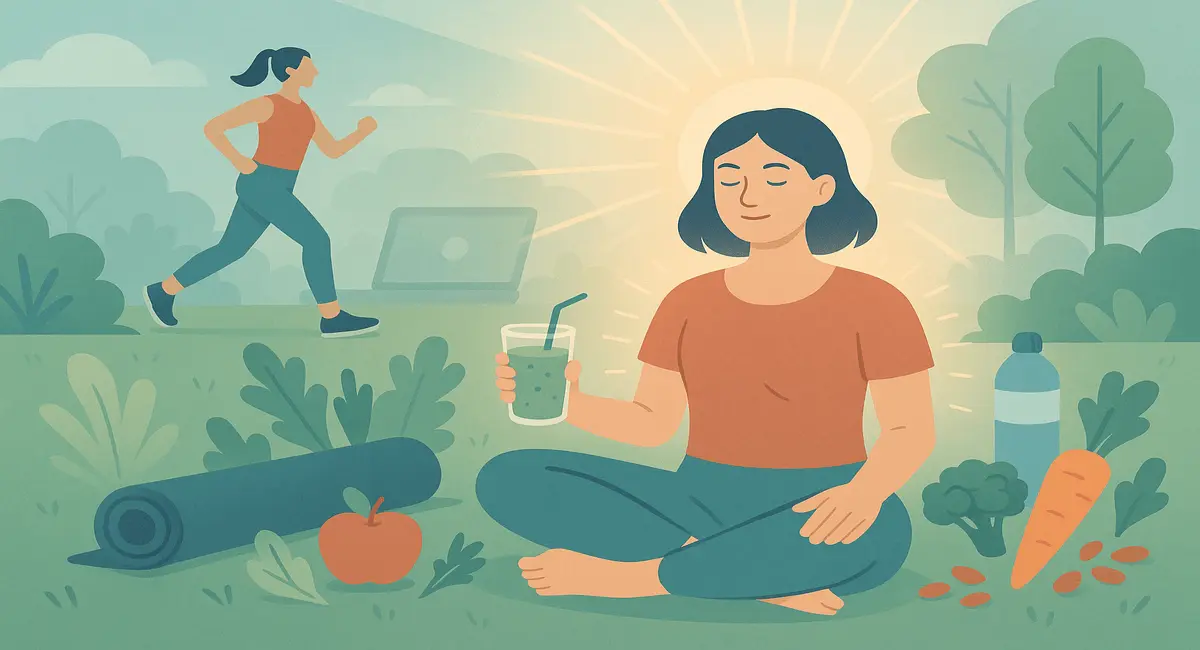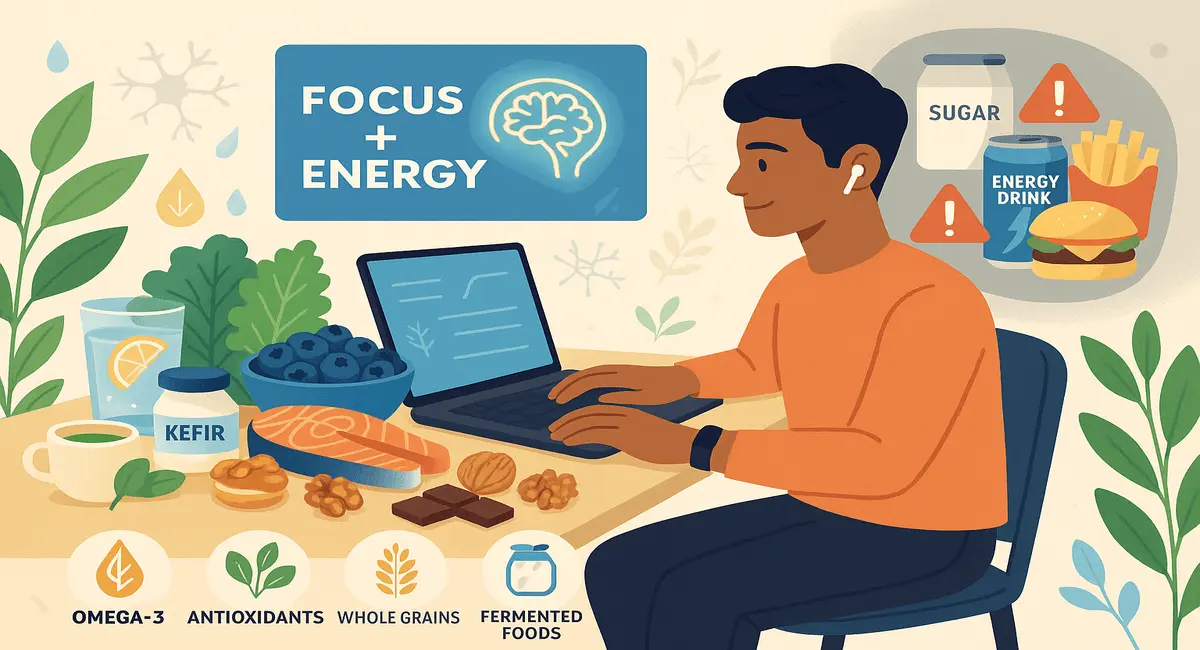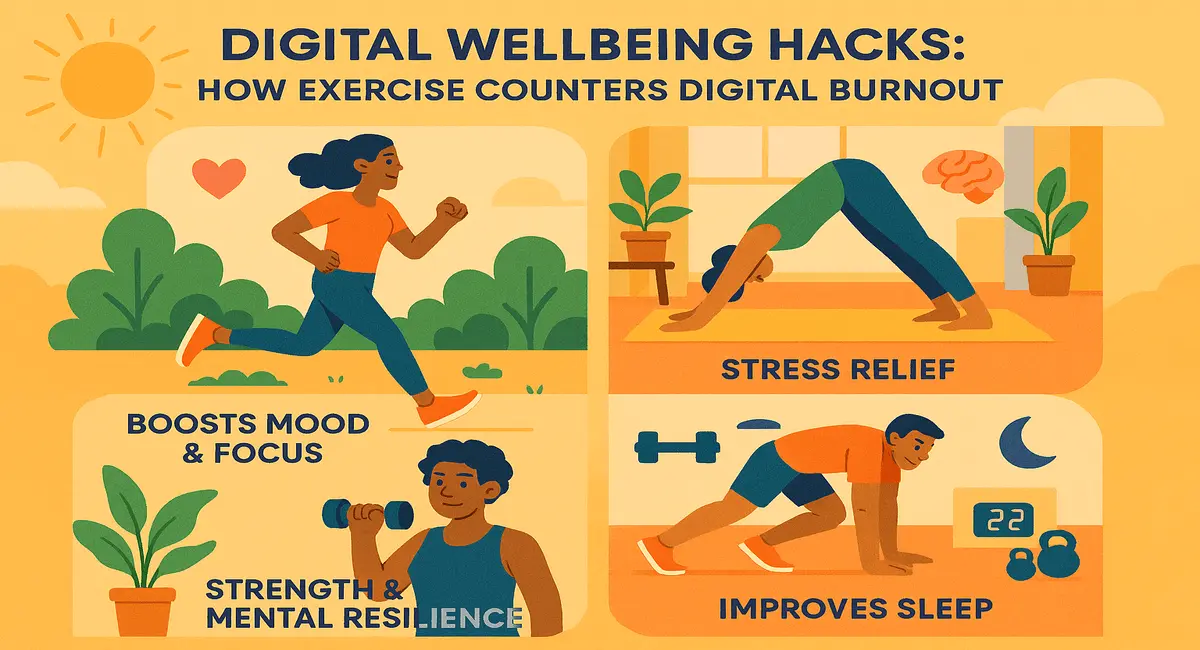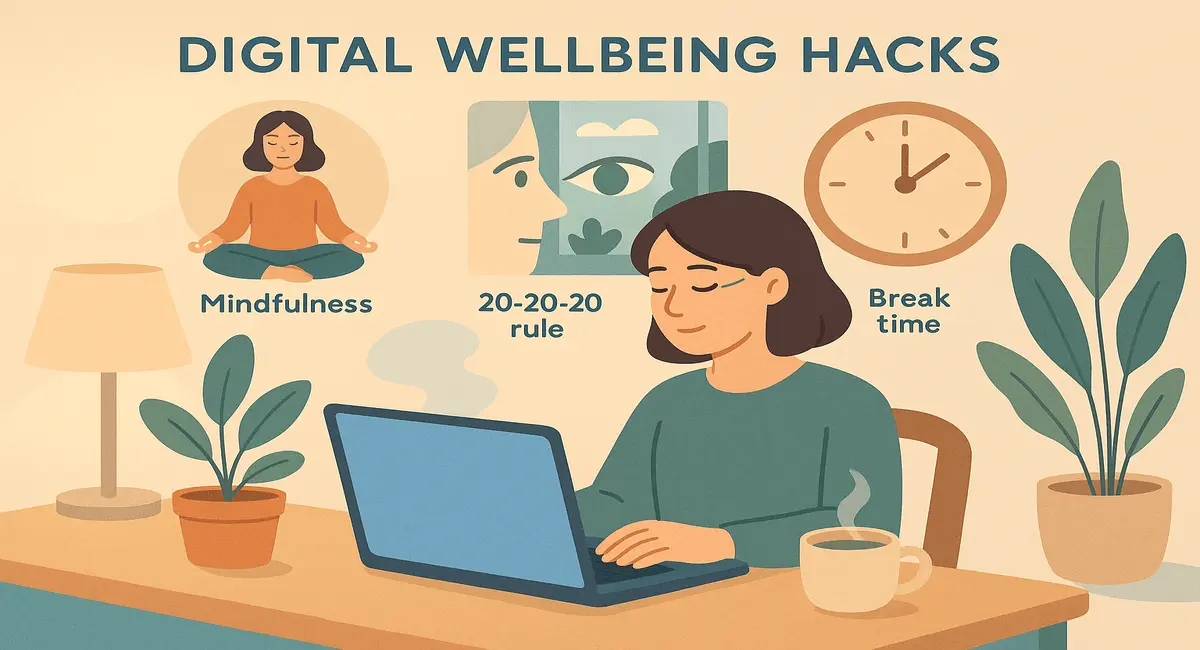Digital burnout is becoming a growing concern as our world becomes increasingly connected. Spending too much time in front of a screen makes us tired, foggy, and less productive. This tiredness, which is often called screen fatigue, affects sleep, mental health, and focus. Fortunately, you can fight these problems with good food and exercise. Eating healthy foods and exercising regularly can give you more energy, make your brain work better, and improve your overall health. These things can help you deal with digital stress better.
This post not only discusses the problem but also provides practical, research-backed strategies to combat digital burnout. You can find answers to popular questions, ideas for exercise, and healthy eating tips here. These are real things you can do right now, not just ideas. Now let’s begin.
Table of Contents
What is Digital Burnout?
The term digital burnout describes both physical and mental tiredness that results from excessive use of technology. It is more than feeling tired after a long day. Symptoms include:
- Persistent fatigue, even after rest
- Brain fog or difficulty concentrating
- Irritability or anxiety
- Disrupted sleep
- Lowered productivity

Causes include prolonged screen exposure, prolonged sitting, and poor eating habits. Unlike general stress, digital burnout stems from our constant use of devices—think endless emails, social media, or video calls. And you’re not alone. Research from the American Psychological Association (2023) reveals that 60% of adults experience screen-related fatigue weekly. If you’re feeling this way, you’re not alone.
The Science Behind Lifestyle and Burnout
Your brain and body work as a team. Too much screen time disrupts this balance. Blue light from screens lowers melatonin, a hormone that regulates sleep, per a 2022 study in Frontiers in Neuroscience. Poor posture from slouching over devices causes neck and back pain, reducing focus. Inactivity and unhealthy eating further harm brain function.
A sedentary lifestyle spikes cortisol, the stress hormone, clouding your thinking. Poor nutrition, like high-sugar diets, causes blood sugar swings and worsening fatigue. On the flip side, a balanced diet and regular exercise support cognitive health, reduce stress, and improve resilience, according to The Journal of Clinical Nutrition (2024).
Nutrition Strategies to Combat Digital Burnout
Eating well gives your brain energy and keeps you from getting burned out. Based on research, here are some tips to help you make the most of your diet.
Brain-Boosting Foods
Some foods make your brain work better and make you less tired:

- Omega-3 fatty acids, which are available in foods that are high in fat, such as flaxseeds, walnuts, and fish, have been shown to enhance memory and decrease inflammation (Nutrients, 2023).
- Antioxidants, such as blueberries, spinach, and dark chocolate (with 70% or higher cocoa content), protect brain cells from oxidative stress.
- Whole grains, such as brown rice, quinoa, and oats, offer consistent energy, thereby preventing blood sugar fluctuations.
- Leafy greens: Kale and broccoli are rich in vitamin K and folate, which support brain health.
- Fermented foods, such yogurt and kefir, increase gut health, which has been connected to improved mood via the gut-brain axis (Nature Reviews Neuroscience, 2024).
Stay Hydrated
Lack of water makes it harder to focus and makes you more tired. A study in The Journal of Physiology in 2021 found that even being 2% dehydrated makes it harder to think clearly. You should drink between 8 to 10 glasses of water every day. Herbal teas or water with fruit in it can help you stay hydrated.
Foods to Avoid
Some foods exacerbate burnout symptoms:
- Sugar can cause energy crashes and brain fog, as per a study published in The American Journal of Clinical Nutrition (2023).
- Processed foods: High in trans fats, they slow cognitive function.
- Excess caffeine: Overuse disrupts sleep and increases anxiety.
How Exercise Can Help Fight Digital Burnout
The best way to refresh your mind and body is to do some exercise. This is how it helps you.
Boosts Mood and Focus
Physical activity, even in small doses, triggers the release of endorphins and serotonin, instantly lifting your mood and sharpening your mental focus. In fact, a 2023 study in The Journal of Sports Medicine discovered that just 20 minutes of exercise a day can boost your focus by a staggering 25%.
Lowers Stress Hormones
Exercise helps reduce cortisol levels, easing stress caused by screen overload. Aerobic activities, in particular, help calm the nervous system, as noted in Frontiers in Psychology (2024).
Enhances Sleep and Energy
Exercise on a regular basis not only helps you sleep better and have more energy during the day, but it also gets you ready for a healthier, more active life. A 2022 meta-analysis in Sleep Medicine Reviews found that working out can help you fall asleep faster and wake up feeling better, which can make your day more productive and energizing.

Best Exercises to Fight Burnout
Pick workouts that fit into your schedule and help with signs of burnout:
- Walking: A 30-minute walk, preferably outside, can help you feel better and lower your stress. Environmental Research (2023) says that being outside more makes the benefits stronger.
- Yoga or stretching: Poses like downward dog or spinal twists can help you relax and stand up straighter.
- Strength training: Bodyweight exercises or light weights build physical and mental resilience.
- HIIT: (High-Intensity Interval Training), such as 20 seconds of burpees followed by rest, is ideal for busy individuals. It’s effective in just 15 minutes, per Medicine & Science in Sports (2024).
A Sample Daily Routine to Beat Digital Burnout
A structured routine can change the way you do things. Here’s a plan that will work:
- Morning: In the morning, walk briskly for 10 minutes in the sun. Eat a breakfast like Greek yogurt with berries and nuts.
- Midday: Take 5 5-minute break every 90 minutes—snack on hydrating foods like cucumber or oranges.
- Afternoon: Eat a healthy dinner, like grilled chicken with quinoa and spinach, in the afternoon. Do a 20-minute workout, like yoga or high-intensity interval training.
- Evening: In the evening, put down your phone and do some gentle stretching to relax. Don’t look at screens for an hour before you go to bed. Keep a journal and write or read in it.
Digital Wellbeing Hacks
A slight change can make a big difference:

- Filters for blue light: Use apps or glasses to help your eyes feel better when you use a screen.
- Mindfulness: Mindfulness (2023) says that a 5-minute meditation session can help you relax.
- 20-20-20 rule: The 20-20-20 rule dictates that every 20 minutes, one should gaze 20 feet away for 20 seconds to provide their eyes with a respite.
- Screen breaks: Every hour, take a pause from your screens to regain your focus.
Breaking Myths About Digital Burnout
Misunderstandings can make it harder to get better. These are some common myths:
- Myth: Reducing screen time is all it takes to get over burnout.
- Truth: Sleep, diet, and exercise are all equally important.
- Myth: Taking supplements will quickly fix burnout.
- Truth: Whole foods and lifestyle changes are more effective, though omega-3 supplements may help with medical guidance.
- Myth: Recovery takes months.
- Truth: Consistent changes can yield results in 1-2 weeks, according to the Journal of Behavioral Medicine (2024).
Why Nutrition and Exercise Work Better Together
Scientific research shows that eating well and working out together is better than either one alone. Eating well gives you energy for your workouts, and working out helps your body absorb nutrients better.
For instance, eating meals high in protein after a workout helps muscles heal, and being active makes insulin more effective, which keeps blood sugar levels stable. A study in Nutrients in 2023 found that this combination is 30% better at reducing fatigue than either one alone, which is more proof of its benefits.
Frequently Asked Questions (FAQs)
What is digital burnout, and how is it different from stress?
Digital burnout is a state of exhaustion resulting from excessive tech use, characterized by brain fog and fatigue. Stress is broader, often tied to life events, not just screens.
Can diet alone help recover from digital burnout?
Diet helps, but works best in conjunction with exercise and regular screen breaks. Nutrient-rich foods fuel the brain, but movement boosts mood and energy.
What are the best foods for reducing brain fog and screen fatigue?
Omega-3s (found in salmon and walnuts), antioxidants (present in berries and spinach), and whole grains (such as quinoa and oats) help clear fog and improve focus.
How much exercise is needed to beat digital burnout?
Aim for 20-30 minutes of daily exercise, such as yoga or walking, which is essential for the preservation of one’s physical health. Even 10-minute sessions can be beneficial if done regularly.
What is the fastest way to recover from digital fatigue?
Combine short workouts, hydration, and screen breaks. A 10-minute walk and water intake can offer quick relief.
How long does it take to reverse burnout with lifestyle changes?
Improvements can begin in 1-2 weeks with a consistent diet, regular exercise, and adequate rest, as reported in the Journal of Behavioral Medicine (2024).
Does drinking more water reduce brain fog?
Yes. Dehydration impairs focus. Drinking between 8-10 glasses of water daily can help boost clarity, according to a study published in The Journal of Physiology (2021).
What is a digital detox, and should I try it?
A digital detox is a time when you stay away from screens, such not using your phone for a few hours. It works to clear your mind.
Conclusion
You don’t have to let digital burnout run your life. Working out and good nutrition are proven ways to get your energy back, improve your focus, and improve your mental health. Begin with small steps, such as drinking more water, going for a walk, or replacing processed snacks with whole foods.
These changes that seem easy can have a big effect on how you feel and how well you do, giving you hope and motivation for a healthier future.
Sources
At Make Human Healthy, we are committed to providing accurate and reliable health information. We ensure that all content is backed by scientific research, peer-reviewed studies, and credible health organizations. Our resources are carefully selected to maintain the highest standards of integrity, transparency, and reliability, so you can trust the information we provide.
American Psychological Association – Screen time and emotional problems in kids: A vicious circle? https://www.apa.org/news/press/releases/2025/06/screen-time-problems-children
National Library Of Medicine – Physical Activity, Cognition, and Brain Outcomes: A Review of the 2018 Physical Activity Guidelines – https://pmc.ncbi.nlm.nih.gov/articles/PMC6527141/
Springer Nature – Gut–brain axis and neuropsychiatric health: recent advances – https://www.nature.com/articles/s41598-025-86858-3
ResearchGate – Dehydration Impairs Cognitive Performance: A Meta-analysis – http://researchgate.net/publication/325936696_Dehydration_Impairs_Cognitive_Performance_A_Meta-analysis
The American Journal of Clinical Nutrition – Long-term dietary protein intake and subjective cognitive decline in US men and women – https://ajcn.nutrition.org/article/S0002-9165(22)00124-1/fulltext
National Library Of Medicine – Exercise can improve sleep quality: a systematic review and meta-analysis – https://pmc.ncbi.nlm.nih.gov/articles/PMC6045928/
National Library Of Medicine – Omega-3 fatty acids and cognitive function – https://pubmed.ncbi.nlm.nih.gov/36637075/
Sleep Foundation – Blue Light: What It Is and How It Affects Sleep – https://www.sleepfoundation.org/bedroom-environment/blue-light
This content is written by Dr. Arshi Thakur. If you found this content helpful, please consider sharing it on your social media to help others benefit from it!
Please note: Our website services, content, and products are for informational purposes only. Make Human Healthy does not provide medical advice, diagnosis, or treatment.
